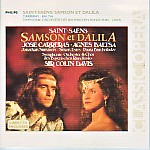This is one of those earnest, professional performances that flounders on account of its lack of character. José Carreras, past his prime and sounding strained in his heroic moments (never mind the love duet with Baltsa), can’t hold a candle to Vickers in the classic EMI set, or even Domingo on DG. Agnes Baltsa sings well, but not especially memorably (Rita Gorr on EMI and Christa Ludwig on RCA take the prize here), and Jonathan Summers makes an unconvincing High Priest. Colin Davis conducts efficiently, but with no particular feeling for the work. The Bacchanal hasn’t a shred of sensuality, and the entire closing scene hangs fire. The sudden increase in tempo at the end sounds less like the cataclysmic collapse of the Philistine’s temple and more like a desire on the part of all concerned to be done with it and go home. Perhaps this is an exaggeration–it’s not a bad performance, but you get the picture. Set it next to Prêtre on EMI and you can hear exactly what’s missing, even though EMI’s most recent remastering doesn’t compare to the much better (but still glassy) sonics here. In short, this set stands a distant third behind EMI and DG (Barenboim).
































